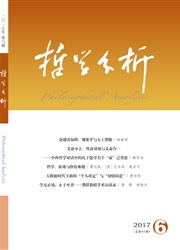

 中文摘要:
中文摘要:
应得是正义的核心概念,社会应得是分配正义的核心概念。分配正义既涉及每个人的自我所有权,又涉及每个人可分享的社会公共资源,涉及他从国家和社会中获取的社会权利和经济利益。每个人都拥有完全的自我所有权,这种所有权是他享有很多权利的基础,但不是他享有社会应得的基础。社会应得表示任何人都能够从社会中获得的公有价值或共享资源。社会应得的基础是人在共同体中享有的成员资格,这种资格取决于他在政治、社会和经济结构中的地位。社会公平意味着每个人在社会经济领域里得其应得。社会应得理论是一种社会资源分配理论,关注在社会基础资源分布、配置和分配中存在的社会公平问题。它既主张全面保护每个人的自我所有权,慎重对待自我所有权的交易、变更和补偿,又主张每个人均等地享有基本的社会资源,申明回到社会公平的起点,为缓和社会矛盾提供可行路线。
 英文摘要:
英文摘要:
Desert is the core concept of justice, and social desert is the core concept of distributive justice. Distributive justice involves not only the self-ownership of each person, but also the public resources people share and the social fights and economic interests they acquire from the state and society. Everyone has total self-ownership, which forms the basis of many of the rights they enjoy, but this is not the basis of their social desert. Social desert refers to the public value and shared resources that each person can acquire from society. Its basis is people's status as members of a community, a status determined by their position in the political, social and economic structure. Social justice means that everyone gets their just desert in the socioeconomic sphere. The theory of social desert is a theory of resource distribution concerned with social justice in the distribution and allocation of basic social resources. It advocates not only the protection of self-ownership and careful treatment of self-ownership transactions, modifications, and compensation, but also equal enjoyment of basic social resources. Announcing a return to the starting point of social justice, it provides a feasible path to easing social contradictions.
 同期刊论文项目
同期刊论文项目
 同项目期刊论文
同项目期刊论文
 期刊信息
期刊信息
